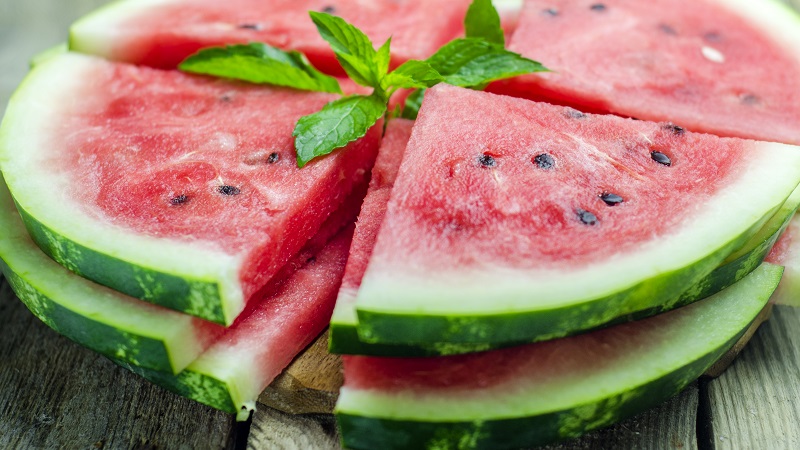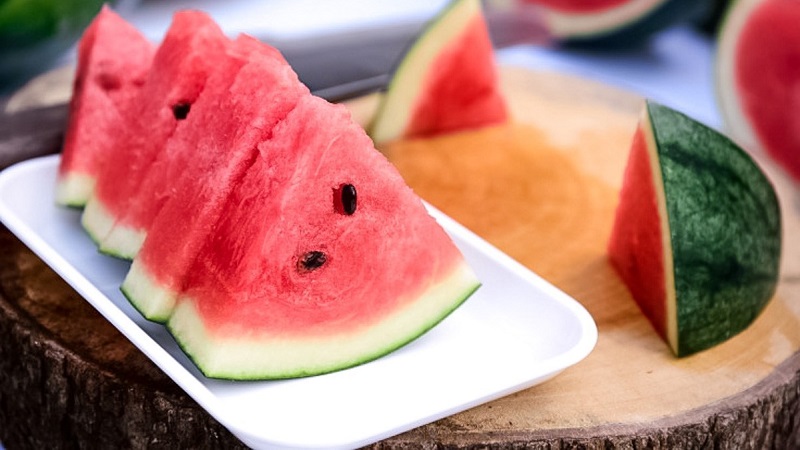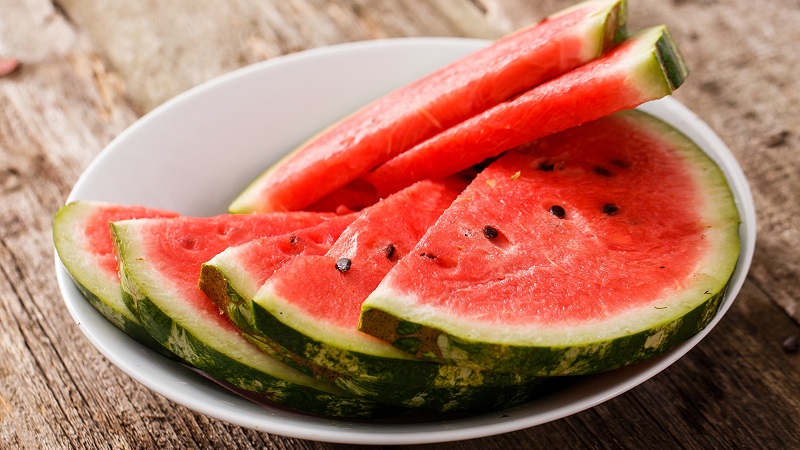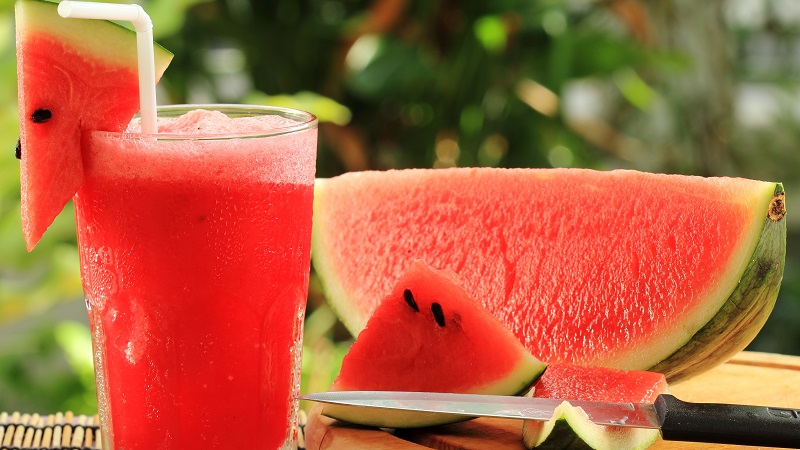Is it possible to eat watermelon with stomach and duodenal ulcers: the benefits and possible harm of the berries
Stomach and duodenal ulcers are chronic diseases. Patients are forced to constantly monitor their diet, avoid foods that irritate the mucous membrane and increase the production of hydrochloric acid. Watermelons are on the list of prohibited foods.
In the article we will talk about the benefits and dangers of watermelon pulp with an ulcer. You will also find out in which cases you will have to refuse to use it.
The content of the article
The benefits and harms of watermelon
Watermelon pulp has powerful healing effect on the human body due to its rich chemical composition:
- The amino acid L-Citrulline prevents muscle soreness after hard workouts in the gym. Those who drank a glass of fresh watermelon before class noted a decrease in pain after 24 hours.
- Vitamin A has a beneficial effect on vision.
- The substances arginine and citrulline reduce blood pressure and the risk of cardiovascular disease.
- Fiber normalizes digestion, eliminates spasms in the gallbladder.
- High diuretic activity helps to cleanse urine, reduce oxalate in the kidneys.
- Arginine enhances erectile function.
- Lycopene reduces the risk of ovarian cancer in women during menopause.
- Watermelon pulp improves skin elasticity, moisturizes and prolongs youth.
- In the kidneys, citrulline is synthesized into the amino acid arginine, which supports the body's defenses and improves the functioning of the heart muscle.
- Lycopene has antioxidant properties and prevents the development of cancer cells.

The harmful effect of watermelon on the body develops with excessive use and combined with heavy food. Instead of digestion, food fermentation begins in the stomach, which leads to unpleasant sensations (diarrhea, bloating, heartburn) and failure of the digestive tract.
Read also:
Is it possible to melon with a stomach ulcer
How to use pumpkin for medicinal purposes for stomach ulcers
Chemical composition
Detailed the vitamin and mineral composition of watermelon is shown in the table.
| Name | Content | Norm |
| Vitamin A | 17 mcg | 900 mcg |
| Beta Carotene | 0.1 mg | 5 mg |
| Vitamin B1 | 0.04 mg | 1.5 mg |
| Vitamin B2 | 0.06 mg | 1.8 mg |
| Vitamin B4 | 4.1 mg | 500 mg |
| Vitamin B5 | 0.221 mg | 5 mg |
| Vitamin B6 | 0.09 mg | 2 mg |
| Vitamin B9 | 8 μg | 400 mcg |
| Vitamin C | 7 mg | 90 mg |
| Vitamin E | 0.1 mg | 15 mg |
| Vitamin K | 0.1 μg | 120 mcg |
| Vitamin PP | 0.3 mg | 20 mg |
| Potassium | 110 mg | 2500 mg |
| Calcium | 14 mg | 1000 mg |
| Silicon | 12 mg | 30 mg |
| Magnesium | 12 mg | 400 mg |
| Sodium | 16 mg | 1300 mg |
| Sulfur | 6.1 mg | 1000 mg |
| Phosphorus | 7 mg | 800 mg |
| Chlorine | 24.7 mg | 2300 mg |
| Iron | 1 mg | 18 mg |
| Iodine | 0.02 μg | 150 mcg |
| Cobalt | 2 μg | 10 mcg |
| Manganese | 0.038 mg | 2 mg |
| Copper | 42 μg | 1000 mcg |
| Selenium | 0.4 μg | 55 mcg |
| Fluorine | 1.5 mcg | 4000 mcg |
| Chromium | 0.23 μg | 50 mcg |
| Zinc | 0.1 mg | 12 mg |
KBZHU
Nutritional value of watermelon:
- calorie content - 27 kcal;
- proteins - 0.7 g;
- fats - 0.1 g;
- carbohydrates - 5.8 g;
- fiber - 0.4 g;
- water - 93 g.
Is it possible to eat watermelon with stomach and duodenal ulcers
Stomach ulcer and 12 duodenal ulcer - local lesion of the mucous membrane, formed under the influence of the gram-negative bacteria Helicobacter pylori. This is a dangerous condition that exacerbates the flow of bile into the stomach and provokes the production of hydrochloric acid. Without treatment, internal bleeding develops or, even worse, a through hole appears.
After identifying the disease, doctors prescribe appropriate treatment and diet., without which complete recovery is impossible. During this period, foods that irritate the walls of the intestines and stomach are prohibited. This list also includes melons and watermelons.
Doctors are of the opinion that it is better to refuse to use watermelon at the time of exacerbation of the disease... Gradually returning to the diet is allowed in the remission stage, starting with small portions.

Points for and against
Let's start with arguments against watermelon in the acute period of the disease:
- The pulp contains a lot of vitamin C (7 mg per 100 g), which irritates the stomach lining and causes bleeding.
- The product promotes the production of hydrochloric acid, which causes a chemical burn to the walls of the digestive tract, aggravating the course of the disease.
- Watermelon increases the acidity of the stomach, causing discomfort (pain, heartburn).
- The pulp is prohibited because of the fiber, which injures the intestinal wall.
- The stomach ulcer is accompanied by diarrhea, and the strong diuretic effect of the product contributes to the intensification of the unpleasant phenomenon. This leads to dehydration and increases the risk of relapse.
May be helpful:
Why is watermelon juice useful and how to cook
Do watermelons ripen when plucked?
How to understand that a watermelon has gone bad and what to do
It is advisable to talk about the positive effect of watermelon on the body with an ulcer in the case ofwhen the disease went into remission. Even a small amount of pulp will help:
- strengthen immunity, thanks to the same vitamin C;
- strengthen capillaries and blood vessels;
- remove toxins;
- eliminate bleeding gums;
- improve complexion;
- replenish potassium stores and improve heart function;
- remove excess fluid from the subcutaneous fat.
Watermelon with exacerbation of an ulcer
During the period of exacerbation of stomach and duodenal ulcers, patients sit on a strict diet that excludes the use of fruits, berries, raw vegetables. That is, products containing coarse fiber that can injure the affected mucous membrane. All food should be boiled, steamed, or chopped. No hot sauces, fried and overly fatty foods, vinegar pickled foods.
Watermelon is on the list of prohibited foods due to the increased content of ascorbic acid and fiber, the ability to increase the acidity of the stomach. With a duodenal ulcer, you can drink watermelon juice diluted with water, but you can not eat the pulp.

In chronic form
During the period of remission, the berry can be returned to the diet no earlier than six months later. after completion of the main treatment. During this time, the intestinal and stomach tissues will have time to fully recover. The decision on the possibility of introducing non-acidic berries and fruits into the diet is made by the gastroenterologist after assessing the state of the mucous membrane.
If the pains return, you will have to give up the use of watermelon pulp.
Rules for use with an ulcer
In order not to harm health, doctors recommend adhere to the rules for the use of watermelons with ulcerative lesions of the gastrointestinal tract:
- Eat the product no more than twice a week.
- Discard early fruits harvested in early August. They have a high content of nitrates.
- Pay attention to the color of the pulp. It should be dense, red or scarlet, without yellowness and white streaks.
- Do not consume the product immediately after taking it out of the refrigerator. Cold food irritates the mucous membranes.
- Eat watermelons during the period when the symptoms of the disease are subsiding and only as a dessert after the main course.
- Do not swallow the watermelon seeds.
Usage rates
With gastric ulcer and 12 duodenal ulcer in remission the daily intake is 150-300 g. Doctors recommend that this amount be divided into two doses in order to understand how the body will react.

Contraindications and precautions
Doctors recommend use the product with caution:
- with type 2 diabetes due to the large amount of fructose;
- in case of impaired renal function due to a diuretic effect;
- in violation of the outflow of urine;
- with pyelonephritis;
- with ulcerative lesions of the gastrointestinal tract in the stage of remission of symptoms.
You will have to completely abandon the product in case of an increase in symptoms ulcers in the acute period of the disease.
Reference. It is forbidden to give watermelon pulp to children under one year old due to the risk of bloating.
Conclusion
Watermelon is one of the products that are difficult to refuse during the summer season. But diseases of the gastrointestinal tract require adherence to a gentle diet with strict food control. In case of ulcerative lesions of the stomach and duodenal ulcer during an exacerbation, doctors strongly recommend that you stop eating melons. The ban is caused by an increased content of ascorbic acid and fiber, which provoke irritation of the walls.
You can return a treat to the diet when the disease turns into a chronic form. But even during this period, experts advise to monitor the reaction of the body.